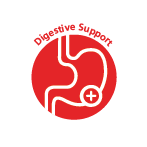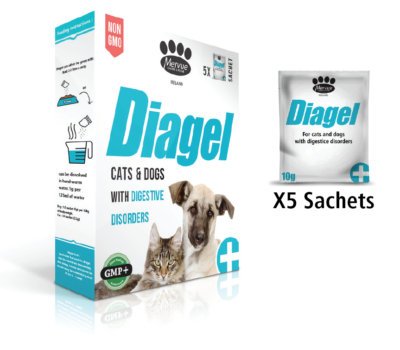- +353 21 422 0397
- info@mervue.ie
- Mon - Fri: 09:00 - 17:00
 Digestive upsets are common in dogs. One study demonstrated how common mild vomiting and diarrhoea are in the general dog population, with approximately 19% of the dogs vomiting and 15% having diarrhoea over a two-week period. Prolonged digestive upset can result in weight loss and ill thrift and requires veterinary attention to establish the underlying cause. Constipation is another cause of digestive upset in dogs.
Digestive upsets are common in dogs. One study demonstrated how common mild vomiting and diarrhoea are in the general dog population, with approximately 19% of the dogs vomiting and 15% having diarrhoea over a two-week period. Prolonged digestive upset can result in weight loss and ill thrift and requires veterinary attention to establish the underlying cause. Constipation is another cause of digestive upset in dogs.
Vomiting and diarrhoea are not only unpleasant for the dog but are extremely unpleasant for owners to manage and clean up, especially if the dog is an indoor pet. Owners understandably feel distressed seeing their pet unwell as they would be to see a family member unwell. Pet owners should be aware that some infectious causes of diarrhoea such as Salmonella and Campylobacter, can be transmitted to humans and are referred to as zoonosis.
 The most common cause of digestive upset in dogs is usually dietary indiscretion which involves the dog eating something disgusting and/or rotten or eating too much and is often associated with raiding the rubbish bin. One study as reported above 40% of dogs were shown to scavenge. Other cause of vomiting and diarrhoea which are less common but more complicated to manage, include an obstruction in the intestine, intestinal inflammation caused by food allergies, certain drugs and tumours. Other diseases such as liver disease, kidney disease and diabetes can all cause vomiting, and less frequently diarrhoea. Constipation can cause vomiting as the faeces distend the colon which applies pressure on the stomach causing vomiting.
The most common cause of digestive upset in dogs is usually dietary indiscretion which involves the dog eating something disgusting and/or rotten or eating too much and is often associated with raiding the rubbish bin. One study as reported above 40% of dogs were shown to scavenge. Other cause of vomiting and diarrhoea which are less common but more complicated to manage, include an obstruction in the intestine, intestinal inflammation caused by food allergies, certain drugs and tumours. Other diseases such as liver disease, kidney disease and diabetes can all cause vomiting, and less frequently diarrhoea. Constipation can cause vomiting as the faeces distend the colon which applies pressure on the stomach causing vomiting.
Like humans, dogs have good bacteria in their intestines which aid in the digestion of food and they also synthesise many essential vitamins.
Any digestive upset, can negatively impact the numbers of good bacteria and may allow bad bacteria to become established. Similarly, antibiotic treatment may alter the balance between good and bad bacteria in the intestine and lead to digestive upset. Therefore, it is important to replenish the good bacteria in the intestines to aid digestion and to provide additional vitamin sources and energy sources until the condition resolves and the cat returns to normal digestive health.

PROBIO PLUS is a recovery gel containing a probiotic called Enterococcus faecium which plays a crucial role in digestive health. Enterococcus faecium acts as a defending barrier against invading bad bacteria, aids in the digestion of food and the harvesting of energy harvest from the diet. In addition, Enterococcus faecium provides nutritional support for the cells lining the intestines and stimulates the development of the intestinal immune system. Many probiotics such as Enterococcus faecium produce short chain fatty acids promote normal gut motility. Changes in the normal intestinal bacteria have been linked to chronic intestinal diseases in both dogs and cats. PROBIO PLUS also contains dextrose which acts as a source of energy, which is especially important if your dog is not eating and it also contains electrolytes to replace those that have been lost through vomiting and diarrhoea. PROBIOPLUS also contains a range of B vitamins to help to restore appetite and support normal metabolism and antioxidant vitamins E and C to counteract damage caused to intestinal cells.
 DIAGEL has been specifically developed and formulated for dogs that experience diarrhoea or constipation. DIAGEL contains psyllium which absorbs liquids and toxins and helps to normalise the faeces in the case of diarrhoea. The ability of DIAGEL to absorb liquid, also helps to soften the stools and aid passing of stools in dogs experiencing constipation. DIAGEL also contains dextrose as an energy source and several B vitamins. The B vitamins are typically synthesised by the good bacteria in the normal health intestine, so their supplementation during times of digestive upset is very important.
DIAGEL has been specifically developed and formulated for dogs that experience diarrhoea or constipation. DIAGEL contains psyllium which absorbs liquids and toxins and helps to normalise the faeces in the case of diarrhoea. The ability of DIAGEL to absorb liquid, also helps to soften the stools and aid passing of stools in dogs experiencing constipation. DIAGEL also contains dextrose as an energy source and several B vitamins. The B vitamins are typically synthesised by the good bacteria in the normal health intestine, so their supplementation during times of digestive upset is very important.
Copyright © 2019 Mervue Laboratories. All Rights Reserved.